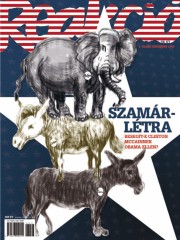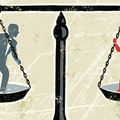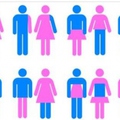Megjelent a papírblogunk, ennek tartalmából szemezgetünk. Márciusban egyik fő témánk a magyarországi elitképzés: hol van nemzedékünk, és hol van annak leendő elitje? Folytatódik Blőd című szürreális képregénysorozatunk: Rudi taxis tovább kalandozik, még több sötétség, gyilkosság és kínai a képsorokon.

Szép, hosszú interjút készítettünk Nyírő András netguruval, az Internetto és az Index alapító főszerkesztőjével. Legújabb, Wifi Falu nevű projektjéről riportot is olvashattok az újságban: ott voltunk a Csereháton, ahol a cigány kissrácok alig várták, hogy rávethessék magukat a netes játékokra. A CSR, a vállalatok társadalmi felelősségvállalásának magyarországi állapotának a MÁV példája segítségével jártunj a végére. Száguldó reakciós riportereink, Novák Tamás és Skrabski Fruzsina a helyszínről tudósítottak Koszovóból és Belgrádból a legfeszültebb napokban.
 Címlapsztorink az Egyesült Államok elnökválasztási kampánya: Benkő Levente kollégánk Amerikából jelentkezett, ahol méterekről látta McCain agg arcát. Közgazda tollforgatónk az amerikai jelzálogpiaci hitelválság tüneteit vázolta fel.
Címlapsztorink az Egyesült Államok elnökválasztási kampánya: Benkő Levente kollégánk Amerikából jelentkezett, ahol méterekről látta McCain agg arcát. Közgazda tollforgatónk az amerikai jelzálogpiaci hitelválság tüneteit vázolta fel.
Oli bácsi ezúttal az ünnepekről mongya meg a frankót, a Doromboló Cicus a Mix magazinhoz törleszkedik.
Bemutatjuk a határon túli magyarokat segítő Hármashalom Alapítványt, gasztrorovatunkban gombászunk, majd készülünk a pekingi olimpiára. YoHely rovatunkban a Kanári-szigetekre látogatunk el. Férfi szemmel-női szemmel írunk az italozásról, Lelky Lola a díszpi*ákról rántja le a leplet, majd családorientált rovatunkban a korai pályaválasztásról olvashatunk mókás gyerekszáj-megjegyzéseket.
Kultúra rovatunk éles váltással indul: bevezetésként doom metál, stoner rock lemezeket recenzálunk az acélszívűeknek, majd nagyívű reakciós elemzést olvashattok a Nyugat folyóirat máig ható üzenetéről. Schöpflin György professzor, a Nyugat-kritikus unokája interjúnkban az európai elitkultúra válságáról elmélkedik.
Tízforintos dal - a hazai és nemzetközi zeneipar vészharangot kongat, a kedves közönség meg csak tölt, csak tölt. Aztán magyar színház, magyar Schindler, magyar szobrász következik, utóbbiban Robin Masters mutat fel piros lapot Melocco Miklósnak, a Radnóti-sor átköltőjének.
Interjút olvashattok Kowalskyval, a Black Out korábbi és a Kowalsky meg a Vega jelenlegi énekésével, valamint Futaki Attilával, képregényünk lassan nemzetközi hírű alkotójával. Építész rovatunkban kiderítjük, hogy is működik az ipari rehab, végül a konzervatív anarchista magyarázza el: van ingyenebéd.
A lapszámmal kapcsolatos kritikát, dicséretet, lehúzást, bratyizást ide várunk, nagy tisztelettel!






